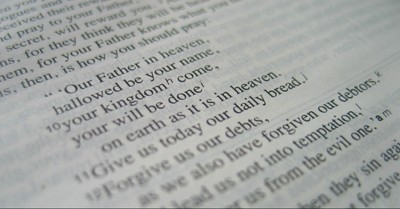A Verse-by-Verse Explanation of The Lord’s Prayer
Prayer


Audio By Carbonatix
By Whitney Hopler, Crosswalk.com
The Lord’s Prayer is one of the most well-known and loved prayers in the Bible. Jesus taught it to his disciples as a model of how to pray. You can find it in Matthew 6:9-13. These verses reveal how you can approach God with reverence, depend on him daily, seek his will, receive his forgiveness, and trust his protection. Too often, people recite this prayer without truly considering its meaning in conversations with God. When you wonder what to say to the Creator of the universe, Jesus gives you this wonderful guidance. Jesus teaches how to approach God, what to prioritize, and what to ask for.
The Lord’s Prayer reorients your perspective, lifting your focus from your own immediate concerns to the eternal majesty of God, and then gently bringing you back to your daily needs for provision, forgiveness, and guidance. Here’s a verse-by-verse explanation of The Lord’s Prayer to help you discover ways to apply each part to your own life and strengthen your relationship with God.
Photo Credit: ©GettyImages/Matthew Maude

“Our Father in heaven, hallowed be your name.” – Matthew 6:9
Jesus begins by teaching you to call God “Our Father.” This is personal. Instead of approaching a distant ruler, you’re approaching a loving Heavenly Father who knows you completely and loves you unconditionally. Calling God “Father” highlights how you’re one of God’s beloved children, who are valued and welcomed. Yet, God is also “in heaven,” which reminds you of God’s majesty and authority over all creation. This balance of closeness and reverence sets the tone for prayer. By teaching you to pray this way, Jesus invites you into the same close relationship he has with the Father.
The word “Our” reminds you that you’re part of a larger family. You don’t just pray “My Father,” but “Our Father,” because you’re part of a global community of believers who share the same heavenly parent. The phrase “in heaven” establishes God’s wondrous majesty and sovereignty. While God is our close Father, he is also the transcendent Creator who reigns over all. God is near enough to hear your whispers, but also powerful enough to command the universe. Think back to a time when you felt misunderstood by others but found comfort in simply being heard by someone who cared. That’s what it’s like to come before God as Father. You don’t need perfect words to speak; all you need is an honest heart.
When you start prayer by honoring God’s name, you can focus your prayers well. Instead of focusing on your problems, you can focus on God’s presence with you. Honoring God’s name also means reflecting God’s character. If God’s name is holy, then your life as God’s child should reflect that holiness. So, it’s important to do your best to live a holy life. Every time you make holy choices – like choosing kindness instead of criticism, honesty instead of lies, or faith instead of worry, you’re living a life that honors your Father’s holiness. How does thinking of God as “Father” change the way you pray? In what ways can you honor God’s name in your words and actions today?
Photo Credit: ©GettyImages/ArtyFree

“Your kingdom come, your will be done, on earth as it is in heaven.” – Matthew 6:10
God’s kingdom can come to all of creation, but in this fallen world, you need to use your free will to choose it. When you pray “your kingdom come,” you’re asking for that heavenly reality to break into our earthly reality. Praying “your will be done” involves lining up your desires with God’s desires, so you can fulfill God’s purposes in your life and in this world, just as God fulfills his purposes in heaven.
When you pray, “Your kingdom come,” you’re asking God to reign not only in the world but also in your own heart and mind. It’s a prayer of trust, where you acknowledge that God’s plans are better than your own. God’s kingdom is wherever God’s will is done – where God’s love and truth prevail. Reflect on an experience when your own plans fell apart, yet something better came from it. Maybe you lost an opportunity but later found a path that brought greater peace or purpose. Experiences like these teach you that God’s will always lines up with his wisdom for what’s best for you.
Praying for God’s will also means being willing to act as God leads you. It may involve choosing to forgive someone who has hurt you, generously giving your time or money to an important cause, stepping forward in courage to use your God-given talents for good work, or anything else God leads you to do. As you say “yes” to God, he will work through your life to extend his kingdom here on Earth. What part of your life – like a habit or a relationship – is hardest for you to surrender to God’s will? Trust that area to God. Ask God to make you an agent of his kingdom right here and now, and ask the Holy Spirit to help you do so. You become an answer to your own prayer when you live out God’s will! How can you do God’s will during your day today?
Photo Credit: ©iStock/Getty Images Plus/fotostorm

“Give us today our daily bread.” – Matthew 6:11
Here, Jesus turns your attention to the importance of relying on God to meet your needs. “Daily bread” represents all of your needs – both for your body and for your soul. Jesus called himself the “bread of life” (John 6:35). When you pray for your daily bread, you’re asking God to sustain you with his presence and give you everything you need to live, like food, shelter, strength, and peace. It’s a humble request that teaches you to trust God one day at a time. God invites you to trust his timing and to rely on his fresh provision every single day.
Consider someone you know who’s facing uncertainty, like a serious health struggle or a time of unemployment, but who chooses to trust God for strength each morning. He or she may not know what tomorrow holds, but that person still finds peace in knowing the God who holds tomorrow. The heart of praying for daily bread is releasing your worries about tomorrow and embracing the grace God offers you today.
The more you pray this part of the Lord’s Prayer, the more you can develop a positive and thankful mindset. Instead of focusing on what’s missing from your life, you can notice the many small yet significant blessings that God is constantly pouring into your life, such as a friend’s encouragement, a good meal, or even the breath in your lungs. What worries can you turn into prayers and rely on God to help you with those situations? How can you thank God for the “daily bread” that’s already in your life?
Photo Credit: Thinkstock/EwaPix

“And forgive us our debts, as we also have forgiven our debtors.” – Matthew 6:12
Sin creates a debt. So, when you ask God to forgive your debts, you’re being honest with God about how you sometimes make mistakes like all people do, and you need God’s mercy and help to learn and grow. This part of the prayer invites you to confess your sins and seek God’s forgiveness. When you do so, God won’t condemn you; he’ll help you by cleansing and renewing your soul. In this verse, Jesus connects receiving forgiveness with offering it. Forgiving the people who have hurt you isn’t easy. You may carry a lot of pain from hurtful words, broken trust, or other kinds of mistreatment. Holding onto bitterness can feel like it’s protecting you from being hurt again, but in reality, it keeps you in pain. Since God has forgiven you for your sins, be willing to forgive others for theirs, with God’s help.
When you pray this part of the Lord’s Prayer, you may need to pause and ask God to help you release a grudge you’ve been holding on to. Doing so doesn’t mean what happened was okay. It just means releasing the person who hurt you from the “debt” they owe you and trusting God to bring justice into the situation. Forgiveness frees you to fully experience the freedom God wants you to enjoy. Choosing to forgive heals you even more than it heals the people who have hurt you, because it unblocks your heart from God’s love flowing freely there. Nothing is more important spiritually than letting God’s love flow through your life!
As you pray this verse, you can examine your relationships. Is there someone you need to forgive, or someone from whom you need to seek forgiveness? How does remembering God’s mercy toward you help you offer mercy to others?
Photo Credit: ©GettyImages/PeopleImages

“And lead us not into temptation, but deliver us from the evil one.” – Matthew 6:13
The final line of the Lord’s Prayer asks God for guidance and protection. The temptation to sin is a reality for every person in this fallen world, where evil spirits try to draw you away from God’s will. When you pray “lead us not into temptation,” you’re asking God to give you strength, guide your decisions, and protect your heart and mind from being led away from God’s best for you. Think of a situation in which you faced a strong temptation to sin. Maybe you were tempted to speak in anger or act in a way that would compromise your integrity. Whenever you find yourself in a situation like that, prayer can connect you with God’s power to overcome temptation. God won’t remove all temptations from your life, but he will give you the help you need to avoid sin whenever you face temptation.
In 1 Corinthians 10:13, the Bible reminds you that God is faithful and will not allow you to be tempted beyond what you can bear. God’s deliverance may come to you through new thoughts, a trusted friend’s advice, or the strength to walk away from a dangerous situation. Prayer prepares you to recognize God’s will and choose it when you find yourself being tempted. This part of the prayer encourages you to set healthy boundaries, seek accountability, and fill your mind with God’s truth. You don’t fight spiritual battles alone; God is your defender and protector. You can ask for God’s help in specific areas where you know you’re weak. For example, if you struggle with gossip, you can pray for protection in conversations. Or, if you struggle with greed, you can pray for deliverance from materialism. What temptations do you face right now that require God’s strength to overcome? How can you seek God’s protection and help through prayer?
In conclusion, the Lord’s Prayer is Jesus’ example of how to pray, but also how to live. Each line invites you into a deeper relationship with your Heavenly Father. You can learn to approach God with reverence, line up your will with God’s will, depend on God’s provision, receive and give forgiveness, and walk in God’s protection. As you pray, don’t rush through the words. Slow down so you can reflect on each phrase. Let Jesus’ words shape your thoughts and actions.
When you honor God’s name, you remember your identity as his beloved child. When you seek God’s kingdom, you line up your decisions with God’s purposes for you. When you trust God for daily bread, you find peace in his care. When you forgive, you reflect God’s grace. When you seek deliverance, you rest in God’s strength. Consider how you can include the Lord’s Prayer in your daily schedule, such as praying it in the morning to set your focus, or in the evening to reflect on your day. The Lord’s Prayer is a call to live in constant communion with God. The more you pray this powerful prayer from Jesus, the more it will transform you!
Photo Credit: ©Getty Images/Krisanapong Detraphiphat







